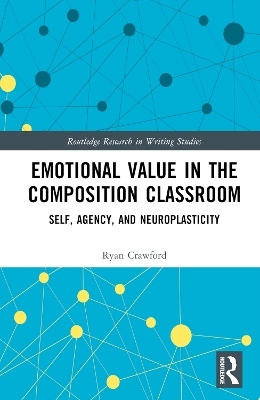
Emotional Value in the Composition Classroom
Routledge (Verlag)
978-1-032-51354-6 (ISBN)
Using the concept of "plasticity," or the brain’s ability to change through growth and reorganization, as a theoretical framework, this book argues that encouraging an exploration of the self better establishes emotional value in the composition classroom.
This book explores recent evidence from studies in modern neuroscience to provide biological correlations between current and developing theory and pedagogy in Composition Studies. Starting with the concept of self, each subsequent chapter builds a neurobiological understanding of how emotional value, intrinsic motivation, creativity, and happiness are constructed and felt. This material exploration shows how these factors can maintain motivation, improve long-term memory, encourage creative risk, and initiate complex considerations of being. Recognizing the shift in Composition Studies to posthuman and new materialist methodologies, this modern neuroscience is presented as a useful parallel to—rather than being at odds with—these and other current methodologies, theories, and pedagogies.
Outlining the need for a more student-focused, guided-discovery framework for the composition classroom, this interdisciplinary resource will be of interest to scholars and students in the field of Composition Studies, Communication Studies, Education, Psychology, and Philosophy.
Ryan Crawford is a lecturer in the English Department and Director of First-Year Writing at the University of New Haven, USA.
Part 1: Plasticity as a Materialist Account of Becoming 1. Modern Neuroscience and Composition Studies 2. Engaging Student Self before Unraveling Identity 3. Emotion, Motivation, and Meaning: Decision-Making and Creative Risk Part 2: The Biological Emergence of Self through Emotional Value 4. Self as Metaphor and Neurobiological Emergence 5. Brain as Apparatus and Sensational Ontology 6. Diffraction of Neuroscience, Agential Realism, and Composition 7. Situated Cognition and Growth Mindset: The Insular Cortex and EBO Part 3: The Sedimented History of Emerging Selves: Molecular Structures of Learning and Memory 8. Memory as Emotional Encoding 9. Microfeatures, Automaticity, and Procedural Memory: Building Creative Power 10. Memory, Learning, and Transfer in Composition 11. Utilizing Plasticity to Modify Affect in Memory Part 4: Wanting, Liking, and Meaning: Intrinsic Motivation and Eudaemonic Reward 12. Eudaemonic Meaning: How Motivation Impacts Experience 13. Motivating Instructors: Finding Value through Student-Centered Emergence 14. Diffractive Motivation and Increase of Transfer 15. Discovery Learning: Expansion of Self through Environment Conclusion: Pedagogical Recommendations Appendix A. Operational Definitions Appendix B. Neurobiological Correlates of Concepts
| Erscheinungsdatum | 26.08.2023 |
|---|---|
| Reihe/Serie | Routledge Research in Writing Studies |
| Zusatzinfo | 10 Line drawings, black and white; 10 Illustrations, black and white |
| Verlagsort | London |
| Sprache | englisch |
| Maße | 152 x 229 mm |
| Gewicht | 585 g |
| Themenwelt | Geisteswissenschaften ► Philosophie |
| Geisteswissenschaften ► Psychologie ► Allgemeine Psychologie | |
| Geisteswissenschaften ► Psychologie ► Sozialpsychologie | |
| ISBN-10 | 1-032-51354-3 / 1032513543 |
| ISBN-13 | 978-1-032-51354-6 / 9781032513546 |
| Zustand | Neuware |
| Informationen gemäß Produktsicherheitsverordnung (GPSR) | |
| Haben Sie eine Frage zum Produkt? |
aus dem Bereich


